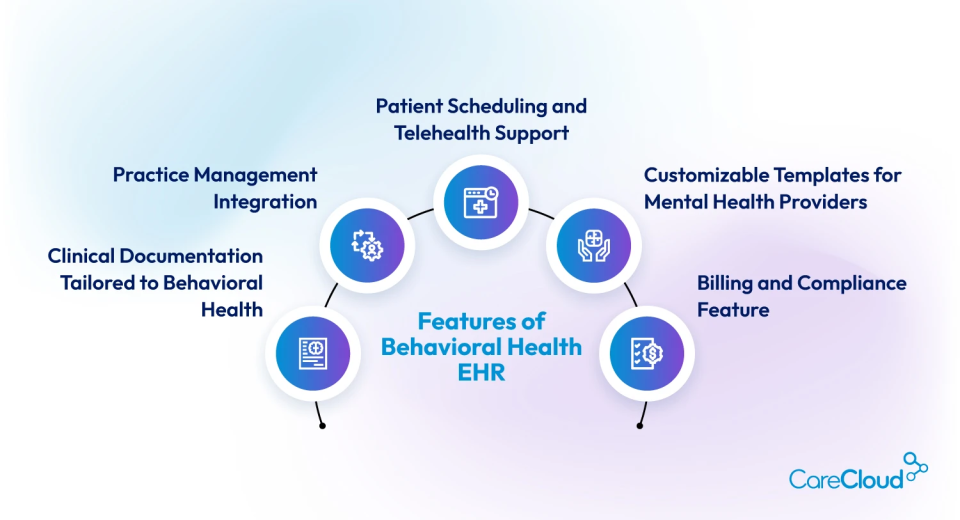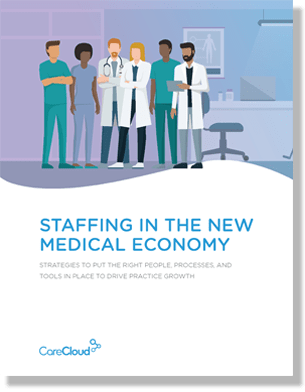A behavioral health EHR (electronic health records) is a specialized digital system designed to manage clinical, administrative, and regulatory information within mental health and substance abuse treatment settings. It helps providers streamline workflows, enhance patient care, and meet the unique demands of behavioral healthcare delivery. Unlike standard types of EHR software, behavioral health EHR software accommodates complex documentation, privacy needs, and patterns of treatment that are necessary for mental health.
Mental health indeed is fast becoming a public health concern. Hence, specialized behavioral health EHR software is very important. According to the National Institute of Mental Health (NIMH), approximately 1 in 5 adults experiences a mental illness in the U.S. Most associated care systems should, therefore, be behaviorally focused, integrated, secured, and customizable.
So, how about the transformation of business operations conducted in clinics by implementing EHR software for behavioral health? In this article, let’s explore the major features and benefits of behavioral health EHR software, how to choose the right system, common challenges, and strategies to overcome them.
Key Features of Behavioral Health EHR
1. Clinical Documentation Tailored to Behavioral Health
General EHRs would be for physical health metrics, but clinical documentation software for behavioral health accepts input for:
- Progress Notes (SOAP, DAP, BIRP)
- Psychological Evaluations
- Treatment Plans with Objectives and Measurable Outcomes
- Reporting of Substance Abuse (including support for 42 CFR Part 2 compliance)
This facilitates clinicians to document patient encounters more accurately and according to clinical and regulatory standards.
2. Practice Management Integration
Most behavioral health EHR systems easily integrate with a practice management solution to streamline scheduling, billing, and clinical document.
- Schedule Appointments
- Monitor Staff Productivity
- Automate Insurance Verification
- Run Performance Reports
An integrated behavioral health EHR reduces the requirement for third-party tools, enabling mental health professionals to operate their entire practice from one platform.
3. Patient Scheduling Portal and Telehealth Support
Due to the increase in virtual care, telehealth integration is crucial. Behavioral health EHR software now typically includes:
- Video conferencing with HIPAA compliance
- Real-time scheduling and automated reminders
- Secure patient portals for forms, messages, and check-ins
This increases the availability of mental health services, particularly in underserved areas.
4. Specialized Templated for Mental Health Providers
Each clinic operates differently, which is why the best behavioral EHR software provides customizable templates and workflows for:
- Psychiatrists
- Psychologists
- Counselors
- Social Workers
Forms that can be filled out in patient intake, crisis intervention documentation, and particular diagnostic tests that make them more usable and accurate.
5. Billing and Compliance Feature
Mental health billing is tricky, especially with Medicare, Medicaid, and managed care plans. Leading behavioral health EHR software provide:
- Support for CPT and ICD-10 codes applicable to mental health
- Claims tracking in real-time
- Auditing and compliance tools (HIPAA, 42 CFR Part 2)
These features help your practice comply with legal requirements and get paid properly and on time.
Benefits of using Behavioral Health EHR for Providers and Patients
1. Improved Care Coordination and Treatment Outcomes
One of the benefits of behavioral health EHR software is that it allows several providers like therapists, case managers, psychiatrists to work more collaboratively. This enhances patient outcomes and continuity of care.
Case Study : A California behavioral health clinic achieved a 20% decrease in hospital readmissions following the implementation of a collaborative EHR system that facilitated effortless coordination among therapists and crisis teams.
2. Enhanced Patient Data Security and Privacy
Behavioral health information is perhaps the most private. A HIPAA-compliant EHR software for behavioral health maintains encryption, access restrictions, and audit trails to safeguard:
- Therapy Notes
- History of Substance Use
- Psychological Assessments
HIPAA and 42 CFR Part 2 compliance is normal in well-established systems.
3. Streamlined Workflows and Reduced Administrative Burden
Automated scheduling, electronic intake forms, and live documentation enable providers to spend more time on care and less time on paperwork. Numerous practices employing a customizable behavioral health EHR software indicate 1–2 hours of daily time savings per provider.
4. Support for Regulatory Compliance
Maintaining compliance with regulations such as HIPAA, CMS mandates, and 42 CFR Part 2 is challenging in the absence of proper tools. EHRs provide built-in controls and audit options to facilitate compliance
How to Choose the Best Behavioral Health EHR Software for Your Practice
Selecting the best behavioral health EHR software is all about assessing your clinical and operational requirements. Here’s how to proceed:
1. Evaluating Customization and Scalability
Is the system able to evolve according to various specialties or scale up with the growth of your practice? Behavioral health EHR software customization is essential, particularly for multi-provider organizations or those who have different workflows.
2. Vendor Reputation and Support
Select a vendor that has a successful history of delivering mental health EHR software. Consider:
- Customer Reviews
- Good Customer Support
- Regular Updates and Compliance Notifications
3. Integration with Existing Tools
Check for compatibility with:
- Telehealth Platforms
- Billing systems
- Lab Interfaces
- Mobile Devices or Tablets
4. Cost Consideration and ROI
Balance-up initial licensing or subscription costs against long-term dividends such as:
- Fewer billing errors
- Lower no-show rates
- Increased patient engagement
ROI-driven analysis enables you to select a platform that’s worth the money in the long run.
Challenges in Implementing Behavioral Health EHR and How to Overcome Them
1. Data Migration and Training
Paper or legacy system migrations require planning. Select a vendor providing onboarding, training, and migration support.
2. Managing Patient Confidentiality
Mental health records demand strict access controls. Insist on role-based permissions and audit trials to protect patient trust and compliance.
3. Balancing Usability with Security
A secure EHR shouldn’t be hard to use. Seek out systems that get the balance just right, easy for staff, safe for patients.
The Future of Behavioral Health EHR: AI and Advanced Features
1. AI-Powered Clinical Documentation
Behavioral health EHR software powered by AI can:
- Suggest diagnosis codes
- Auto-complete clinical notes
- Analyze sentiment in therapy sessions
This reduces clinician burnout and enhances documentation accuracy.
2. Predictive Analytics for Patient Outcomes
Machine learning models can identify patients at risk of:
- Depression relapse
- Suicide ideation
- Missed appointments
Predictive insights enable early intervention and individualized care planning.
3. Integration with Wearable and Remote Monitoring Devices
Smart devices are able to monitor sleep, mood, heart rate, and so on. Future behavioral health EHR software can automatically import this information into graphs, so real-time care adjustments are possible.
Conclusion
Increasing demands are being imposed on today’s mental health practitioners because of regulatory compliance and the provision of effective patient-centered care. A good behavioral health EHR is no longer just something to consider, it has become an integral part of delivering high-quality, compliant, and compassionate mental health care.





